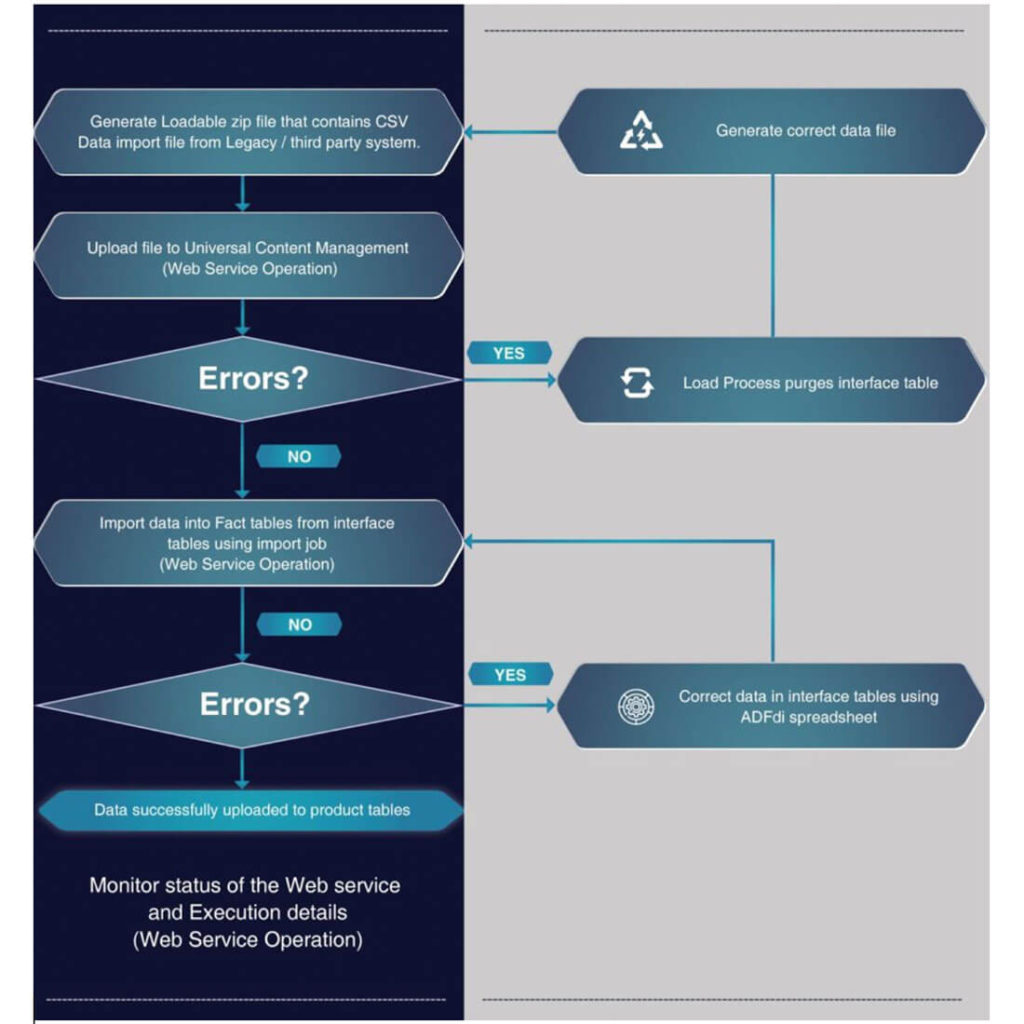
Loading data from external sources(legacy systems and third-party applications) into Oracle Fusion Applications using External Data Integration services.
- Why…?
In the current era when companies are moving towards the cloud, they still want to retain their most important transactional systems. Trinamix integration solutions are defined to give them the most from their legacy systems while moving into the high-performance cloud world.
This leads to a fully functional hybrid integration:A mix of on-premise and cloud systems where diverse solutions are brought together to work as a whole.
- 3 steps solution

The integration process includes the following steps.
Step 1:Generate loadablezip file that contains CSV data import file from Legacy / Third party system according to the requirements of the Oracle Fusion application tables.
- GENERATE CSV DATA IMPORT FILE
Download the relevant file-based data import template from the Oracle Enterprise Repository. Each template includes table specific instructions, guidelines, and each column header consist of comments or bubble text, that include details about the column, such as the expected data type, length, and in some cases other instructional text, that will help you to generate an external data file from third-party system for loading and importing.
Note: Excluding or reordering of column cause unsuccessful data load.
Step 2:File-based load process to load data into interface tables.
Step 3:Application specific data import processes to transfer data from interface tables to fact tables in Oracle Fusion Application.

Automation of External Data Integration services process flow diagram.
Benefits of integration with different systems to bridge the gap between multiple business functions.
Improved data accessibility: With the help of system integration, data accessibility becomes easier for people in the organizations. This leads to better decision making, at different levels, which often results in accelerated business growth.
Better communication: When businesses are well-integrated, the improved connectivity will streamline communication between participants of different operations. As a result of this, companies can easily share more information that was difficult earlier, costly and/or time consuming to access.
Greater productivity: Employees can spend more time on tasks that will help the business to grow rather than having to replicate data and wait for information to be sent to them from other departments.
Reduced Risk of Errors: Due to the fact that data will not have to be replicated, there is less chance of human errors being made which leads to more accurate information available.
Reduced cost: By connecting systems to each other, and by providing a central pipeline through which both old and new systems can communicate, integration allows you to save costs, keep using your existing infrastructure and add functionality.
Robust growth: A rapidly growing company can quickly become entangled with a complex application and system landscape. But with an integrated software system, problems can be solved and changes can be made with just a few clicks rather than visiting multiple systems.
Considering these benefits, one can say that a well-integrated system has become vital for every business to succeed in today’s competitive environment. Because integration is not just about merging the two systems, but also about figuring out new ways to function seamlessly, at the end of the day, only those companies will stay ahead of the game which is integrated as much as possible.
-
Approach used:
Integration with 3rd party application using Microsoft SQL Server and Apache Tomcat as application server on a scheduled basis.
About the Author

Ashrafmahidi Athani is working with Trinamix Inc. as a Systems engineer with two years of rich technical experience in OracleDemantra. He has hands on experience on PL/SQL and JAVA Language.

